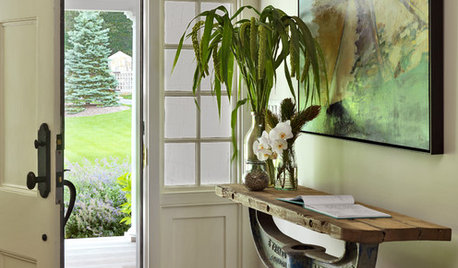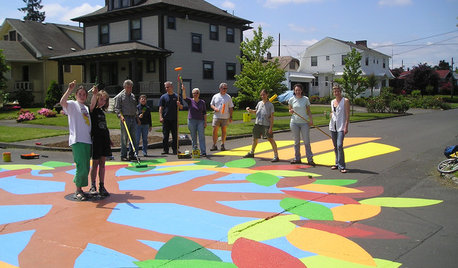Anyone doing sustainable living or visited one?
DanaHealer
21 years ago
Related Stories

BUDGET DECORATINGThe Cure for Houzz Envy: Living Room Touches Anyone Can Do
Spiff up your living room with very little effort or expense, using ideas borrowed from covetable ones
Full Story
BUDGET DECORATINGThe Cure for Houzz Envy: Entryway Touches Anyone Can Do
Make a smashing first impression with just one or two affordable design moves
Full Story
DECORATING GUIDESThe Cure for Houzz Envy: Family Room Touches Anyone Can Do
Easy and cheap fixes that will help your space look more polished and be more comfortable
Full Story
CLOSETSThe Cure for Houzz Envy: Closet Touches Anyone Can Do
These easy and inexpensive moves for more space and better organization are right in fashion
Full Story
HOME OFFICESThe Cure for Houzz Envy: Home Office Touches Anyone Can Do
Borrow these modest design moves to make your workspace more inviting, organized and personal
Full Story
LAUNDRY ROOMSThe Cure for Houzz Envy: Laundry Room Touches Anyone Can Do
Make fluffing and folding more enjoyable by borrowing these ideas from beautifully designed laundry rooms
Full Story
DECORATING GUIDES7 Bedroom Styling Tricks Anyone Can Do
Short on time or money? You can spruce up your bedroom quickly and easily with these tips
Full Story
DECORATING GUIDESThe Cure for Houzz Envy: Guest Room Touches Anyone Can Do
Make overnight guests feel comfy and cozy with small, inexpensive niceties
Full Story
BEDROOMSThe Cure for Houzz Envy: Master Bedroom Touches Anyone Can Do
Make your bedroom a serene dream with easy moves that won’t give your bank account nightmares
Full Story
COMMUNITYCommunity Building Just About Anyone Can Do
Strengthen neighborhoods and pride of place by setting up more public spaces — even small, temporary ones can make a big difference
Full StorySponsored


ReuseRob
DanaHealerOriginal Author
Related Professionals
Glassmanor Landscape Architects & Landscape Designers · Middle River Landscape Architects & Landscape Designers · Winder Landscape Architects & Landscape Designers · Wixom Landscape Architects & Landscape Designers · Gainesville Landscape Contractors · Gallatin Landscape Contractors · Galveston Landscape Contractors · New Berlin Landscape Contractors · Pleasanton Landscape Contractors · Laurel Siding & Exteriors · Columbus Siding & Exteriors · Fairfax Siding & Exteriors · Glen Ellyn Solar Energy Systems · La Mirada Solar Energy Systems · Montclair Solar Energy Systemsseraphima
caitzs
mike_stubbs
Jillrob
flattail
locust
Willow_Summerland
lonegreyrabbit
joel_bc
sandylighthouse